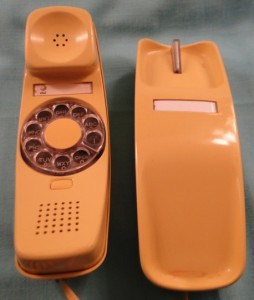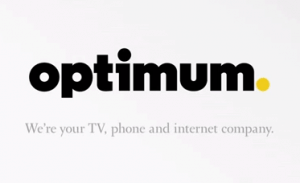
Cablevision’s yesteryear marketing: As outdated as this Harvest Gold Trimline phone.
Cablevision’s bizarre new ads for its Optimum triple-play package (the one that puts broadband, arguably its most important component, dead last) have reached a new low in the latest series featuring… Michael Bolton?
Bolton is a practical unknown to the most important demographic group not buying cable: recent graduate twenty-somethings that were 12 when one of his songs last plagued top-40 radio. Cablevision’s misfire could only be outdone if Nike hired Dick Van Dyke to pitch their shoes.
This is the best Cablevision can manage after Sandy blew away 11,000 of their customers (potentially for good) and rate increases took another 28,000 households with them (mostly to the benefit of Verizon FiOS)? Was the runner-up Joyce DeWitt from Three’s Company pitching a three-pack of phone, television, and (oh yes) Internet service?
Cablevision’s marketing efforts are now partly overseen by the CEO’s wife, who ‘somehow’ landed the prominent role of rebranding Cablevision/Optimum. Perhaps her best talents lie elsewhere.
Verizon featured Michael Bay blowing things up in FiOS ads five years ago that were more trendy than Cablevision was this week.
The point of the ad? Michael Bolton keeps getting annoyed with masses of would-be Cablevision customers calling in to sign up for cable service on a toll-free number that is just one digit away from Michael Bolton’s toll-free number (?) Yes, that is Bolton talking on a (shudder) landline (at least he has a cordless phone). Does anyone under 30 even know what a “toll-free” call is?
For those of us who remember what a dial tone sounds like and can still recognize a Trimline rotary phone, the ad still does not make sense. I am perplexed why Michael Bolton has a toll-free number. I guess when Tonya Harding’s name recognition rivals Michael Bolton’s, the fact he has a toll-free number gives him the edge.
A minute later, I am left wondering why I care. I am not certainly not wondering why I haven’t picked up the phone to order Cablevision service.
When it comes to branding and image, here is what Cablevision just accomplished:
- Verizon FiOS circa 2008 = Michael Bay blowing cool stuff up.
- Cablevision this week = Michael Bolton.
‘Nuff said.
[flv width=”640″ height=”380″]http://www.phillipdampier.com/video/Cablevision Ads Michael Bolton.flv[/flv]
AD FAIL: What were they thinking? Michael Bolton annoys viewers trying to recollect his career while Cablevision tries to make New York, New Jersey and Connecticut remember why they should care. (1 minute)


 Subscribe
Subscribe Verizon Wireless is planning a major audit of their employer discount plans to verify customers’ continued eligibility,
Verizon Wireless is planning a major audit of their employer discount plans to verify customers’ continued eligibility, 
 Time Warner Cable has chosen a gradual transition to IP video for cable television service. Subscribers can expect about a dozen channels per year to be removed from analog service until the cable system offers a completely digital television package. In Maine and New York City, that digital transition is already complete.
Time Warner Cable has chosen a gradual transition to IP video for cable television service. Subscribers can expect about a dozen channels per year to be removed from analog service until the cable system offers a completely digital television package. In Maine and New York City, that digital transition is already complete.


 While Windstream continues to heavily lobby the Georgia legislature for a bill that would ban competition from publicly owned broadband providers, the company is doing little to address the growing concerns of its own broadband customers getting poor service.
While Windstream continues to heavily lobby the Georgia legislature for a bill that would ban competition from publicly owned broadband providers, the company is doing little to address the growing concerns of its own broadband customers getting poor service. The horror stories are already clear all over Windstream’s service areas:
The horror stories are already clear all over Windstream’s service areas: A typical day for the Brown family is to wake up, reset the modem, send an e-mail or two, reset the modem, try to go to a web page, reset the modem.
A typical day for the Brown family is to wake up, reset the modem, send an e-mail or two, reset the modem, try to go to a web page, reset the modem.